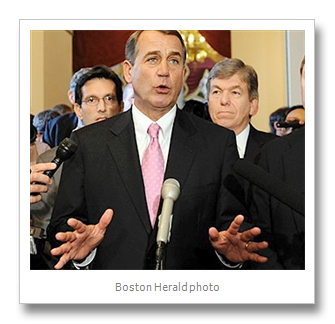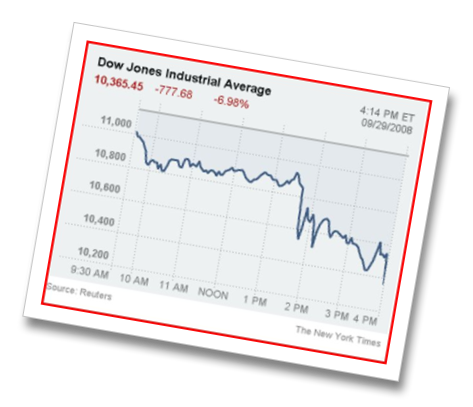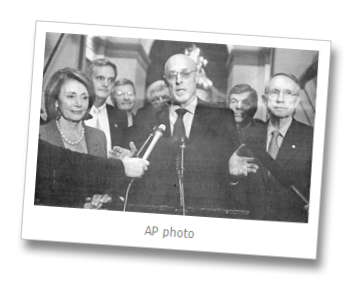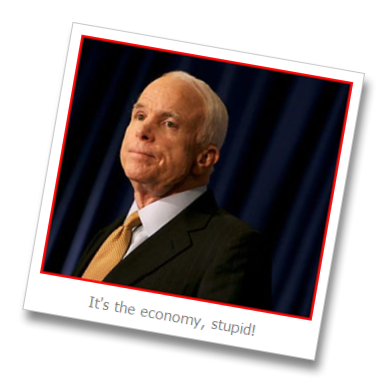Spot has always liked Captain Fishsticks; he reminds Spot of King Banaian, only with something extra: same doughnut, but maybe with icing and some sprinkles. The brow of the Captain is never furrowed with doubt; he has the certainty of the peasants in the People's Crusade, hacking their way cheerfully through the Jews of Europe on their way to Jerusalem, convinced that God was on their side.
He's at it again with an article at MinnPost titled Who's really to blame for the financial meltdown? With that title and that author, you don't really even need to read the article, boys and girls. The Captain believes the government is to blame, naturally.
But Spot read it anyway.
After tut tutting about conservatives who blame the Community Reinvestment Act for the meltdown, Sticks goes on to say, well, it's things like the CRA:
In a managed economy, when government intervenes in the market on behalf of one industry or pushes a specific social goal – passes a Community Reinvestment Act – that action alters the market for capital. The Community Reinvestment Act with its implicit (now explicit) government guarantee to lenders that Fannie Mae and Freddie Mac would provide liquidity for their mortgage loans created a virtually risk-free investment with an artificially high return. This caused two problems.
First, guaranteed low risk and artificially inflated reward caused money to flow into housing that otherwise would have been more effectively invested in other segments of the economy. Eventually, the bubble had to burst – an unsupported money expansion can't go indefinitely.
The second reason:
Government intervention in housing lured capital away from where it had had been profitably flowing. Deregulation enabled investment banks to get in on the real estate action. Playing outside the bounds of market discipline in a virtually risk-free market where weighing the possibility of gain against the probability of loss was unnecessary, is it really a surprise that greed and recklessness ran amok?
The Captain is conflicted here, but he's not even aware of it. "Market discipline" couldn't work because of deregulation? Really? Spot thought that Sticks would think that repealing Glass-Steagall among other things was a good thing.
But greed to the Captain is not "greed" in the Gordon Gekko sense:
"Greed" may not be the right word, but where is the virtue in a person expecting society to finance a home he cannot afford? [yes, Sticks, all those people bought homes they knew would end up in foreclosure] Ironically, while the CRA provided a path to home ownership for some, the investment it was funneling from other parts of the economy lowered the standard of living for many more – economics is always about trade-offs. [let's see you back that one up, Sticks] The question is, who decides what those trade-offs are going to be? In this case is it going to be the secretary of the Treasury or individuals bound by the market discipline of risk and reward?
Oh, it's all those greedy rascals who wanted a home! Not all the mortgage bankers, loan originators, appraisers, and associated flim-flam artists who worked in the real estate industry. Not the loan syndicators nor the investment bankers who profited from commissions on all the mortgage-backed securities they could sell.
All the "professionals" who stood to profit from the bacchanalia day after day are blameless, while we must focus on poor people - many unsophisticated in financial affairs - longing for a home and the government. Swell.
This history of financial bubbles demonstrates that you need a lot more than government to create one.
Sticks is no little "d" democrat. He thinks there is no role for a government to make a policy about anything: no political decisions. He wants to live in a world where, as Nick Coleman memorably put it once, "we're fighting with clubs in the ditches for food." Everything that governments do "distorts the market" or interferes with "market discipline" according to Sticks. Only through the market will our salvation be earned!
The Captain says that any departure laissez-faire capitalism means that the economy is "planned," conjuring up Soviet apparatchiki, which is foolish and paranoid. Frankly, we could use a little planning, or maybe just thinking, about new sources of energy and global warming, to mention just a couple of things. The auto industry - the market - certainly hasn't done the job.
Sticks says that the knowledge of the best way to allocate resources is "embedded in the market." Regrettably, the market isn't talking.
Update: More on this tomorrow, but Spot recommends Ollie on the CRA.





